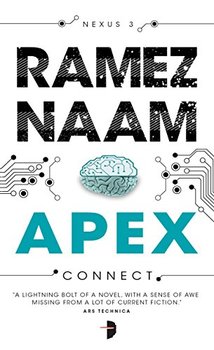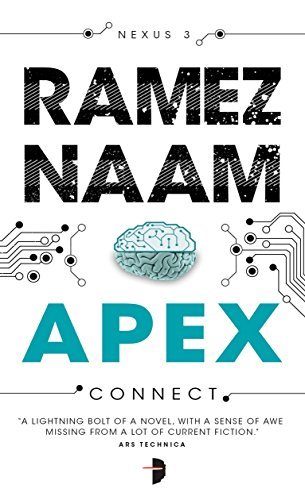
Estimated reading time: 4 minutes
In this brilliant sci-fi trilogy, a new post-human species emerges—and what happens isn’t pretty.The Nexus Trilogy is especially intriguing because Naam is both an accomplished computer scientist and a science fiction author of considerable skill. All three novels in his trilogy are grounded in science. Contemporary research in such fields as neuroscience, artificial intelligence, and nanotechnology suggests the possibility of a post-human future that might resemble the picture he paints. But the books of the trilogy are set in 2040-41, and Naam freely confesses in “The Science of Apex” at the conclusion of the final volume that he would be “surprised if, by 2040, we have brain computer interfaces anywhere near the sophistication” of the technology around which the three novels are centered. Naam implies that he might better have set his story at the end of the 21st century.
A picture of the post-human future in a brilliant sci-fi trilogy
In other words, the Nexus Trilogy gives us some sense of what might be in store for us down the road, give or take a half-century or so. Naam envisions the convergence of neuroscience, computer programming, Buddhist meditation techniques, biotechnology, artificial intelligence, and nanotechnology to create Nexus 5, a drug-like substance that diffuses nanobots throughout a human brain, enabling the individual to communicate telepathically with other Nexus users, even over very great distances.
Some combination of these technologies with cloning has also permitted the creation of trans-human supersoldiers who are stronger, faster, and smarter than human soldiers. At the same time, refinements in the programming of the nanobots and access to a constellation of quantum supercomputers has led a supremely gifted Chinese scientist to transcend even the capabilities conferred by Nexus and elevate herself into what can only be called a new species: a post-human. This new post-human species quickly demonstrates how very far behind mere humans are left.
Apex (Nexus Trilogy #3) by Ramez Naam (2015) 608 pages ★★★★☆
The Nexus Trilogy unfolds
Nexus, the first book of this brilliant sci-fi trilogy, portrays the impact of the development and spread of Nexus 5 and the fierce and violent resistance of both the American and Chinese governments. The two countries have led the rest of the world to ban the drug’s use and imprison anyone found to be using it (including babies born with it in their systems). Crux, the second book, focuses on the life-and-death struggle of Nexus’ creators to evade capture and inevitable torture and death at the hands of governments desperate to stamp out its use. In Apex, the final volume, war between human and post-human breaks out and comes within a hair’s breadth of forever destroying human civilization.
All three books are densely packed, with a huge cast of characters who are followed in short bursts that alternate throughout. The suspense is palpable. The violence is unrelenting.
For related reading
I’ve also reviewed the author’s nonfiction book, More Than Human: Embracing the Promise of Biological Enhancement (How to make humans smarter, stronger, and healthier).
I reviewed book one, Nexus, at The post-human future explored in an outstanding SF novel. Book two’s review is at Not a single dull page in this science-based sci-fi thriller.
This trilogy is included in Good books about artificial intelligence.
For more good reading, check out:
- These novels won both Hugo and Nebula Awards
- The ultimate guide to the all-time best science fiction novels
- 10 top science fiction novels
- The top 10 dystopian novels
- Ten new science fiction authors worth reading now
And you can always find my most popular reviews, and the most recent ones, on the Home Page.


























